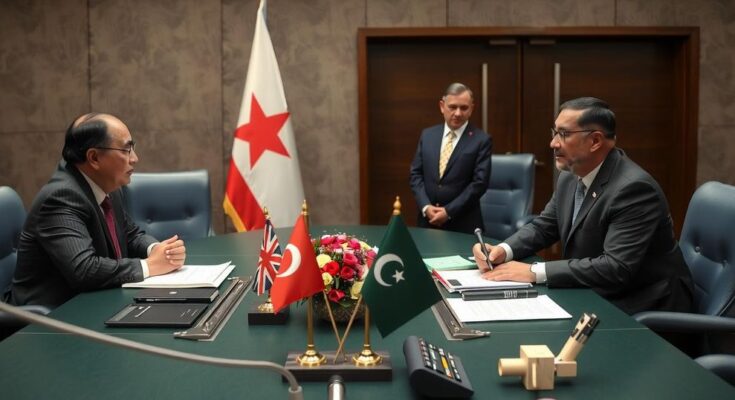Pakistan’s UN envoy, Munir Akram, has highlighted hopes to restore dialogue on North Korea amid its new term as a non-permanent member of the Security Council. He emphasized the importance of addressing tensions in the region and reiterated Pakistan’s commitment to nonproliferation. The Security Council’s dysfunction has raised concerns, especially in light of geopolitical conflicts. Additionally, Akram expressed reservations about the Treaty on the Prohibition of Nuclear Weapons due to India’s nuclear status.
Pakistan’s envoy to the United Nations, Munir Akram, has expressed optimism regarding the enhancement of dialogues related to North Korea as his country embarks on a two-year term as a non-permanent member of the Security Council. In a recent interview with Kyodo News, he articulated Pakistan’s concerns about the insufficient discourse on the situation on the Korean Peninsula. “We hope that in the Security Council, we will find ways of reviving the dialogue and to decrease the tensions in the whole region,” Akram stated.
His remarks follow the annual reshuffle of the Security Council’s composition, which saw five of its ten non-permanent members rotate out as of January 1. Pakistan has now taken on the Asia-Pacific seat held formerly by Japan, alongside Denmark, Greece, Panama, and Somalia, who entered the council from different regions for terms extending to 2026. Previously, Pakistan has participated in the Security Council on seven occasions, the last being from 2012 to 2013.
As a nation possessing nuclear weapons and maintaining diplomatic relations with North Korea, Akram emphasized Pakistan’s support for nonproliferation efforts and advocated for a total ban on nuclear testing. Responding to inquiries regarding a potential seventh nuclear test by North Korea, he affirmed, “So those are principles which will guide our decision.”
The Security Council, tasked with upholding international peace and security, has faced criticism for its ineffectiveness in addressing global crises, a situation exacerbated by the unilateral veto power held by its five permanent members. This dysfunction has been particularly evident since Russia’s invasion of Ukraine in February 2022. Akram called attention to the necessity for non-permanent members to act towards reconciling their differences under these challenging circumstances.
Furthermore, while Pakistan advocates for the establishment of a nuclear weapons-free zone in South Asia, it has reservations in supporting the Treaty on the Prohibition of Nuclear Weapons due to India’s nuclear capabilities. “While we need our nuclear capability to prevent aggression, we cannot support the ban treaty,” he clarified. Despite the treaty’s implementation in 2021, several UN member states, including major nuclear powers such as the United States and Japan, have opted not to join it.
The article discusses Pakistan’s role as a non-permanent member of the United Nations Security Council and its intentions to facilitate dialogue concerning North Korea during its term. It reflects on the broader implications of international diplomacy regarding nuclear proliferation, particularly in the context of regional security in South Asia. The article further contextualizes the challenges faced by the Security Council due to geopolitical divisions among its permanent members, which sometimes hinder effective action on pressing global issues.
In conclusion, Pakistan is keen to revitalize dialogues surrounding North Korea as it assumes its position on the UN Security Council. By prioritizing diplomatic efforts aimed at reducing regional tensions, Pakistan seeks to contribute positively to global nonproliferation initiatives while addressing its own security concerns. The complexities of international relations, especially within the Security Council, remain a pivotal challenge that necessitates collaborative efforts from all member states.
Original Source: english.kyodonews.net




